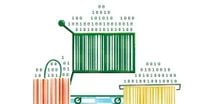In a world where grocery prices continue to climb, many consumers are faced with a tough choice: use a supermarket loyalty card to save money or sacrifice their privacy. Research conducted by NRC reveals that consumers who opt out of loyalty programs can end up paying significantly more for their groceries—up to 600 euros annually, particularly for larger households that remain loyal to a single supermarket.
Supermarkets have shifted their discount strategies, increasingly offering promotions exclusively to customers enrolled in their loyalty programs. This marks a change from previous practices where discounts were available to all shoppers. The findings indicate that at major chains like Albert Heijn and Lidl, a considerable portion of the discounts is restricted to cardholders, leaving those without cards at a financial disadvantage.
For instance, customers participating in Albert Heijn's Premium program benefit from additional savings, receiving discounts on organic products and personalized offers for a fixed annual fee of 14.99 euros. This program is particularly advantageous for larger households, which can see their savings skyrocket due to the exclusive nature of these deals.
Only a few chains, such as Aldi, Plus, and Dirk, still provide discounts without requiring customers to register for loyalty programs. This has left many privacy-conscious shoppers feeling pressured to choose between their personal data and substantial savings.
The research highlights a growing trend: supermarkets are keen to gather data on consumer habits through these loyalty programs. This data enables them to create detailed consumer profiles, allowing for targeted marketing strategies. Shoppers who are aware of this data collection often feel conflicted; while they understand that their purchasing behaviors are being monitored, the allure of discounts makes it difficult to resist signing up.
Peter van Dijk, a participant in the NRC study, expressed this sentiment, stating, "You know they're using your data, but I don’t think my data is worth more than the discount." This reflects a common mindset among consumers who feel that the financial benefits outweigh the privacy concerns.
As supermarkets continue to refine their loyalty programs, they also face scrutiny over the implications of data collection. Nick Bombaij, a researcher at the University of Amsterdam, notes that while these programs can drive customer loyalty and increase spending, they also complicate the measurement of consumer behavior changes. Bombaij explains, "Just participating in a loyalty program makes customers more loyal to a specific chain, leading to an increase in spending of about 1 to 4 percent. However, it’s challenging to measure how their purchasing behavior would differ without such programs."
Moreover, the discounts provided through loyalty programs represent a shift rather than an increase in supermarket costs. Bombaij points out that these discounts were previously available to all customers, but now they are selectively offered to those who share their data. "These costs were already incurred by supermarkets, but now they receive valuable data in return," he adds.
The survey conducted by NRC revealed that the reported savings vary widely among participants, with some households claiming discounts of up to 600 euros per year. This is especially true for larger families who predominantly shop at one supermarket and often prefer organic products. The Premium program from Albert Heijn has become a popular choice, providing significant savings for its members.
In response to the growing demand for privacy, a website called Randombonuskaart.nl was created, allowing consumers to generate random loyalty cards for use at checkout without revealing their personal information. This initiative has gained traction among those wary of data collection, with users able to scan a card at stores like Albert Heijn, Jumbo, and Lidl.
Despite the availability of anonymous options, many consumers still find themselves gravitating towards loyalty programs due to the substantial savings. As the competition among supermarkets intensifies, chains like Jumbo have also started to increase their discount offerings. The interim CEO, Tom Heidman, noted that the importance of promotions has surged, with over a quarter of their revenue now coming from discounted products.
In contrast, some regions have adopted different pricing strategies. For example, in Germany, supermarkets typically maintain fixed prices, while in France, certain promotional tactics, such as buy-one-get-one-free offers, have been banned to protect small businesses. This divergence in practices highlights the varying approaches to consumer engagement across different markets.
As consumers navigate this complex landscape, the choice between privacy and savings remains a contentious issue. Many shoppers express frustration over the necessity of loyalty cards, as highlighted by customer Teska Seligman, who remarked, "I’m against these cards because they collect information, but the discounts are too tempting to pass up in tough times." This sentiment underscores the dilemma faced by many consumers who feel compelled to participate in loyalty programs despite their reservations.
In light of the ongoing debate surrounding consumer data and loyalty programs, the German consumer association has initiated legal action against Lidl over the exclusivity of discounts tied to their Plus app. This lawsuit aims to clarify the obligations supermarkets have regarding the transparency of data collection practices in exchange for discounts.
As supermarkets continue to innovate and expand their loyalty offerings, the relationship between consumer data and discounts is likely to evolve. The increasing prevalence of personalized marketing strategies raises important questions about the future of consumer privacy and the ethical implications of data collection in retail.
In conclusion, the grocery shopping landscape is rapidly changing, with loyalty programs becoming a central feature of the supermarket experience. As consumers weigh the benefits of discounts against their privacy concerns, the dialogue surrounding data collection and consumer rights will undoubtedly intensify.








